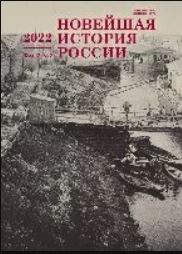Советская молодежь в годы Великой Отечественной войны глазами органов государственной безопасности
Soviet Youth during the Great Patriotic War through the Eyes of State Security Agencies
Author(s): A. I. SavinSubject(s): Civil Society, Sociology, Security and defense, WW II and following years (1940 - 1949)
Published by: Издательство Исторического факультета СПбГУ
Keywords: USSR; Great Patriotic War; state security agencies; youth; underground;
Summary/Abstract: The article introduces unique documents about the security agencies of the USSR into academic circulation. An analysis of these documents and literature enables the author to make new claims about the traditional dual attitude of the Stalinist state towards young people. On the one hand, young people made a large contribution to victory over the enemy both at the front and in the rear. However, especially as the end of the war approached, youth were increasingly interpreted as a dangerous social environment, giving rise to many anti-Soviet organizations and groups. The war danger spurred Chekists to be extremely suspicious of any form of organized youth amateur activity, be it literary or philosophical groups, let alone quasi-political organizations. As a result, state security authorities with redoubled energy set about identifying and eliminating potential political deviations among the youth. First of all, the target was the children of the outcasts of Soviet society: the “former”, “former kulaks”, and “enemies of the people” from among the Soviet elites. At the same time, the war temporarily weakened ideological pressure, giving rise to hopes among broad strata of society for certain relaxations and even reforms after the war. A new factor at the final stage of the war was the mass of young people who found themselves in captivity or in the occupied territories, both imaginary and real collaborators, as well as participants in the armed nationalist movement in Ukraine and other Soviet Republics. The response of the security agencies to the intensification of deviant youth activity was the traditional measures of the intelligence services: building the large-scale undercover informant net in the student and student environment, as well as falsification of cases of anti-Soviet organizations
Journal: Новейшая история России
- Issue Year: 12/2022
- Issue No: 39
- Page Range: 288-302
- Page Count: 15
- Language: Russian

